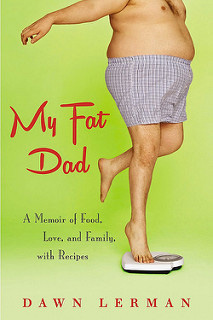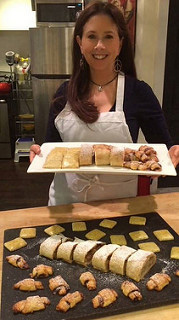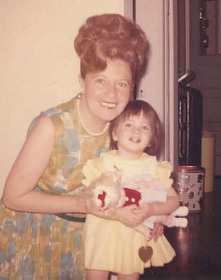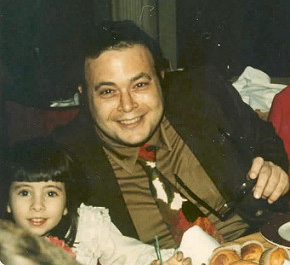 Food and family can be a complicated subject. Our memories, experiences and eventual relationship with food is often colored by our interactions and observations of our parents and food while growing up. The interesting thing is that two people can have similar experiences — for example an overweight parent — and come out with very different, sometimes even opposite — reactions and results.
Food and family can be a complicated subject. Our memories, experiences and eventual relationship with food is often colored by our interactions and observations of our parents and food while growing up. The interesting thing is that two people can have similar experiences — for example an overweight parent — and come out with very different, sometimes even opposite — reactions and results.
Dawn Lerman, author of My Fat Dad: A Memoir of Food, Love, and Family, with Recipes, coming out at the end of the month, grew up with an overweight father and and under-eating mother, and yet became a board-certified nutrition expert who counsels clients on weight loss, diabetes, high blood pressure, and other diet-related conditions. Below she shares some of her story. You can read more by picking up a copy of her book, which is currently available for pre-order.
Carma Spence: What inspired you write My Fat Dad?
 Dawn Lerman: I originally set out to write a health book for kids about snacking. While I was compiling recipes I realized that each one of them had a memory attached to it. The memory was as important as the recipe itself — it was the people I was with at the time; where I was when I tasted it; and the smells that made it so important.
Dawn Lerman: I originally set out to write a health book for kids about snacking. While I was compiling recipes I realized that each one of them had a memory attached to it. The memory was as important as the recipe itself — it was the people I was with at the time; where I was when I tasted it; and the smells that made it so important.
Nourishing yourself and your family is about the love you put into it, which led me to want to share about my family and my maternal grandmother Beauty, whose recipe cards and ultimately, cooking saved me and gave me a purpose. I was able to focus less on the chaos and loneliness I felt in my day-to-day life. The story of how real food had such a positive impact on my life, even in the face of my father’s great weight, felt like an important story. And I definitely wanted to provide the color and context around the recipes that were woven into the fabric of my life.
CS: It seems that much of your childhood was attached to food in some way.
DL: In my house, food and affection were inextricably tied. My father, a successful advertising executive — for popular food products (Leggo my Eggo, Coke is It, and Once you pop you can’t stop) — usually weighed around 450 pounds. His weight would often fluctuate a hundred pounds on either end as he tried (and failed) almost weekly to attempt the latest fad diet. He was always the best customer of the products he was marketing — especially when he was working on Kentucky Fried Chicken, Coke and Budweiser.
My mother, meanwhile, was an aspiring actress and thought food was a waste of money and time. She was happy eating one can of tuna fish over the sink a day.
CS: With that kind of background, how did you develop your passion for healthy eating?
 DL: My parents had very busy social lives and luckily for me, I got to spend every weekend at my maternal grandmother Beauty’s house. When I walked into her kitchen, life transformed from processed packages of salty MSG instant soup to the delicious warm, fragrant smell of homemade chicken soup, sweet kugels and home baked poppy seed cookies. It was the only place I can remember feeling happy, safe and nourished. It was what I craved.
DL: My parents had very busy social lives and luckily for me, I got to spend every weekend at my maternal grandmother Beauty’s house. When I walked into her kitchen, life transformed from processed packages of salty MSG instant soup to the delicious warm, fragrant smell of homemade chicken soup, sweet kugels and home baked poppy seed cookies. It was the only place I can remember feeling happy, safe and nourished. It was what I craved.
CS: So your grandmother became your saving grace?
DL: For a long as I can remember, my time spent with my grandmother revolved around our weekend dinners. On Friday when I arrived, everything was prepared, but on Saturdays we spent the day visiting the baker who gave us warm challah to snack on, the butcher who always gave her the best cuts of meat and the men at the fruit stand who showed us what was in season and ripe. It was very important to my grandmother that I learn about how to create a nice meal with fresh ingredients. “Bread gets moldy, fruit gets soggy and veggies get wilted,” she told me. “If it lasts for months on the shelf, imagine what it does to your body.”
But when I was nine years old my family moved away from my hometown of Chicago. In order to keep us connected my grandmother sent me a 20-dollar bill and a recipe card every week. That way, whatever she was cooking for my grandfather, I could cook for my family — but mostly my sister who I took care of, since the age of ten.
CS: You share a lot about both the good and bad of your upbringing. How do your parents feel about the book?
DL: Both of my parents love the book and are very supportive — my dad, always an ad man, told me “You’ve come a long way baby.” My mom, the ultimate stage mother, shares passages from the book wherever she goes. She just wishes there were more pictures of her in the center of the book.
CS: Your dad doesn’t seem to mind being called “fat.” Why do you think that is?
 DL: While my dad struggled with weight his whole life, he was also an ad man, a comedy writer, and the life of the party. Being fat was just who he was. Now he has it under control but even when he was at his heaviest, he was able to step outside of himself and make jokes. Instead of bookcases, my dad had shirts of every size hanging all over the house, representing different weights.
DL: While my dad struggled with weight his whole life, he was also an ad man, a comedy writer, and the life of the party. Being fat was just who he was. Now he has it under control but even when he was at his heaviest, he was able to step outside of himself and make jokes. Instead of bookcases, my dad had shirts of every size hanging all over the house, representing different weights.
CS: You mention that your dad is more in control of his weight now. What’s the story behind that?
DL: Today, my father weighs 220 pounds and is a vegan. How he got there is a story I share in my book. Food is no longer a barrier that keeps us apart, but a bridge that keeps us connected. There is nothing my dad enjoys more than talking with me about dietary theories and his weight-loss victories. And now I am the one regularly sending recipe cards to my father’s house, just as my grandmother did for me.
CS: It seems to me that with two opposing — and equally unhealthy — relationships to food, you might have found it hard to manage your own perception of body image and weight loss. Did you ever struggle with your weight?
DL: I love food and I choose food that will love me back, like green juices, super foods, smoothies, homemade soup and stews, and big salads. I go to the farmer’s market on Sunday and I try to buy what is in season. Or I go to Trader Joe’s and I stock up on both fresh and frozen fruit and vegetables, sprouted breads, beans, nuts, nut butters, and seeds. I try to cook on Sunday for the whole week and I make little snack bags for both me, my kids, and my clients. Also, when I am starving I usually have a big glass of water. Sometimes we think we are hungry, but we are actually thirsty or bored.
CS: What is your best advice for someone struggling with weight?
DL: As a holistic nutritionist I believe it is important to know your client before making any blanket statement. However, I do think drinking beverages other than soda, like Green Tea is important. Also, people should try to eat simple, filling meals and fill up at least half of their plates with veggies.
Finally, as my daughter says, if it has a commercial attached to it, it usually is not good — this goes for processed foods, especially. How many commercials do we see for kale or strawberries?
CS: If there was one take away from reading your book you would like readers to have, what would it be?
DL: Eating is about much more than protein and carbs and nutrients — it’s about family, history and identity. My grandmother Beauty put it best: “I can find my heritage in a bowl of soup.”
I hope my story helps families create happy memories around food. I also hope that food is seen to be more than just the macro-nutrients, protein, fat or carbs from which it is composed. I have always had a passion for taking any family recipe and making it healthier — I hope readers can see that good food can taste good and you don’t need to give up your traditional favorites if you are willing to exchange a few ingredients (There is an index at the back of My Fat Dad that explains what you can use as a substitute for most of the basics that go into every recipe).
All images used in this post were provided by Dawn Lerman or her representatives.

